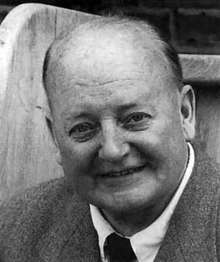Maurice Nicoll
Henry Maurice Dunlop Nicoll (19 July 1884 – 30 August 1953) was a Scottish psychiatrist, author and noted Fourth Way teacher. He is best known for his Psychological Commentaries on the Teaching of Gurdjieff and Ouspensky, a multi-volume collection of talks he gave to his study groups.
Maurice Nicoll | |
|---|---|
 | |
| Born | 19 July 1884 Kelso, Scotland |
| Died | August 30, 1953 (aged 69) |
| Pen name | Martin Swayne |
| Occupation | Psychiatrist, author |
| Nationality | Scottish |
| Subject | Fourth Way |
| Notable works | Psychological Commentaries on the Teaching of Gurdjieff and Ouspensky |
| Relatives | William Robertson Nicoll (father) |
Life and work
Nicoll was born at the manse in Kelso, Scotland, the son of William Robertson Nicoll, a minister of the Free Church of Scotland. He studied science at Cambridge University before going to St. Bartholomew's Hospital and then to Vienna, Berlin and Zürich where he became a colleague of Carl Gustav Jung. Jung's psychological revelations and his own work with Jung during this period left a lasting influence on Nicoll as a young man.[1]
After his Army Medical Service during the first World War, in Gallipoli and Mesopotamia, he returned to England to become a psychiatrist. In 1921 he met Petr Demianovich Ouspensky, a student of G. I. Gurdjieff and he also became a student of Gurdjieff the following year. In 1923, when Gurdjieff closed down his institute, Nicoll joined Ouspensky's group. In 1931 he followed Ouspensky's advice and started his own study groups in England. This was done through a programme of work devoted to passing on the ideas which Nicoll had gathered and passing them on through his talks given weekly to his own study groups. Many of these talks were recorded verbatim and documented in a six-volume series of texts compiled in his book series Psychological Commentaries on the Teaching of Gurdjieff and Ouspensky.
Nicoll also authored books and stories about his experiences in the Middle East using the pseudonym "Martin Swayne".
Though Nicoll advocated the theories of the Fourth Way, he also maintained interests in essential Christian teachings, in Neoplatonism and in dream interpretation until the end of his life.[1]
Bibliography
By Nicoll under his name
Books
- Dream Psychology, 1918
- Psychological Commentaries on the Teaching of Gurdjieff and Ouspensky
- First three volumes privately printed, 1949
- Vincent Stuart Ltd., 1952
- Boston: Shambhala, 1984
- Samuel Weiser Inc., 1996, ISBN 978-0-87728-910-4 (6 volumes)
- The New Man : An Interpretation of Some Parables and Miracles of Christ, 1950
- Living Time and the Integration of the Life, 1952
- The Mark, 1955
- Simple Explanation of Work Ideas
- Privately printed, 1968
- Eureka Editions, 1999
- Notes Taken at Meetings, January 18, 1935 to April 8, 1934; 2000
- Informal Work Talks and Teachings, 2009
Articles
- "Why Is The 'Unconscious' Unconscious?", 1918, The British Journal of Psychology, Volume 9, Number 2
- "Neurosis of War", 1920, The Medical Annual
Under the pen-name "Martin Swayne"
Books
- The Sporting Instinct, 1910
- Cupid Goes North
- Lord Richard in the Pantry, 1916
- In Mesopotamia, 1917
- The Blue Germ, 1918
Stories in periodicals
- "A Game of Consequences", London Magazine, October 1911
- "The Black and Gold Curtain", London Magazine, April 1912
- "The Mystery of the 'Vathek'", Pall Mall Magazine, January 1913
- "Life-Like", The Strand Magazine, February 1913
- "The Piano-tuner", London Magazine, April 1913
- "Sir Clifford's Gorilla", The Strand Magazine, July 1913
- "The Alabaster Jar", The Strand Magazine, August 1913
- "The Flying Log", London Magazine, November 1913
- "The Corot Landscape", The Strand Magazine, November 1913
- "Half a Ton of Dynamite", The Strand Magazine, January 1916
- "The Sleep-Beam", The Strand Magazine, March 1918
- "The Whistling", Lloyd's Magazine, October 1918
- "An Awkward Situation", The Strand Magazine, July 1924
- "A Sense of the Future", The Strand Magazine, August 1924
- "An Obvious Case", The Strand Magazine, October 1924
References
- Nicoll, Maurice. Psychological Commentaries on the Teaching of Gurdjieff and Ouspensky. 1. York Beach, Maine: Samuel Weiser Inc. ISBN 978-0-87728-899-2.
External links
- Works by Maurice Nicoll at Project Gutenberg
- Works by or about Maurice Nicoll at Internet Archive
- Works by Maurice Nicoll at LibriVox (public domain audiobooks)

- The New Man An Interpretation of Some Parables and Miracles of Christ